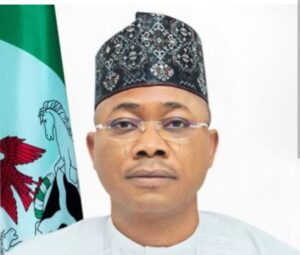

By Dada Ahmed.

Kogi State, located in Nigeria’s central region, has long been a state with significant untapped potential. In recent years, the rise of Alha Usman Ahmed Ododo as the governor has brought fresh energy and a visionary approach to governance in kogi. Ododo, renowned for his forward-thinking leadership, has earned the respect of many across Kogi due to his strategic policies aimed at driving sustainable growth, inclusive governance, and social development.
Ododo’s political journey is a testament to dedication, resilience, and a commitment to serving the people. A native of Upogoro in Okene Local Government Area of Kogi State, his career has been rooted in understanding the unique challenges faced by the state.
The governor began his career in public service and steadily rose through the ranks, gaining experience and exposure to the complexities of governance. His deep knowledge of the state’s socio-economic landscape he learned from the rope,gave him an edge when it comes to formulating solutions that resonate with the people.
Ododo’s rise to prominence as a key political figure is marked by his ability to connect with grassroots communities while engaging meaningfully with elite stakeholders. This balance has helped him craft a leadership style that emphasizes transparency, accountability, and inclusiveness.
His reputation for being approachable and open to dialogue has also helped foster unity in Kogi, a state with diverse ethnic groups and sometimes competing political interests.
Ododo’s leadership, characterised by visionary governance and development, is built on a framework of transformational governance that prioritizes infrastructure development, education, healthcare, and economic empowerment. Since stepping into the spotlight, Ododo has focused on key sectors that directly impact the lives of ordinary citizens.
One of his primary objectives has been addressing the infrastructure deficit that has plagued Kogi State for years.
His government has embarked on road construction projects to enhance connectivity between rural areas and urban centers, facilitating easier access to markets and services.
In the area of education, Ododo has focused on ensuring that schools are equipped with the necessary resources to provide quality education. He believes that education is the foundation of any progressive society, and his administration has worked to improve the standard of primary and secondary schools across the state.
Healthcare is another sector that has seen significant improvement under Ododo’s leadership. With a focus on providing accessible healthcare services to even the most remote communities, the state government has invested in the construction and renovation of hospitals, as well as the provision of modern medical equipment. Programs aimed at addressing maternal and child health, along with disease prevention, have also been rolled out to ensure a healthier population.
Ododo’s leadership has been underscored by efforts to ensure the growth and development of the state mby diversifying the state’s economy.
Recognizing Kogi’s vast natural resources, including its rich mineral deposits, Ododo has worked to create an enabling environment for investors. By promoting private sector involvement in mining, agriculture, and tourism, his administration has not only boosted the state’s revenue base but also created job opportunities for the youth.
Kogi’s agricultural potential is vast, and Ododo’s policies are designed to harness this potential to improve food security and generate income for local farmers.
One of the hallmarks of Ododo’s leadership is his dedication to listening to the people, reminiscent of the concept of people-centred leadership by ensuring that people’s voices are heard and that their concerns are addressed.
His administration has adopted a bottom-up approach to governance, where policies are shaped by the needs and aspirations of the people. This has fostered a sense of ownership and participation among the populace, further strengthening the relationship between the government and the people.
Ododo’s leadership philosophy revolves around inclusion, ensuring that all segments of the society—youths, women, and marginalized communities—are part of the state’s development process. Women’s empowerment programs, youth mentorship initiatives, and support for small businesses have been key components of his agenda. By promoting equal opportunities for all, Ododo has been able to foster a culture of innovation and entrepreneurship in Kogi State.
Like any leader, Ododo has may be facing challenges , especially security concerns, and the complexities of managing a diverse state may pose significant hurdles. Political analysts believe that his pragmatic approach and willingness to collaborate with federal authorities and international partners would enable him to make strides in addressing these issues.
Looking ahead, the people of Kogi State say they are optimistic about the future with the Ododo as their governor.
According to them,Ododo’s leadership,based on consolidating on the performance of his predecessor and political mentor, Alhaji Yahaya Bello as well as his ability to navigate the complexities of governance, with a clear vision for progress, set him apart as a leader to watch.
As Kogi State continues on its path to development, Ododo’s legacy is sure of shaping up to be one of transformational leadership that prioritizes the welfare of the people.
In a state marked by both challenges and opportunities, many kogites assert that Usman Ododo’s leadership represents a beacon of hope.
Others note that his strategic vision, commitment to inclusive governance, and focus on sustainable development has set him on the course of widespread recognition, as a leader to be cherished in the act of good governance.
As Kogi State moves forward, Ododo’s leadership is setting the standard for future governance, with a focus on creating a brighter, more prosperous future for all.
-AI.


